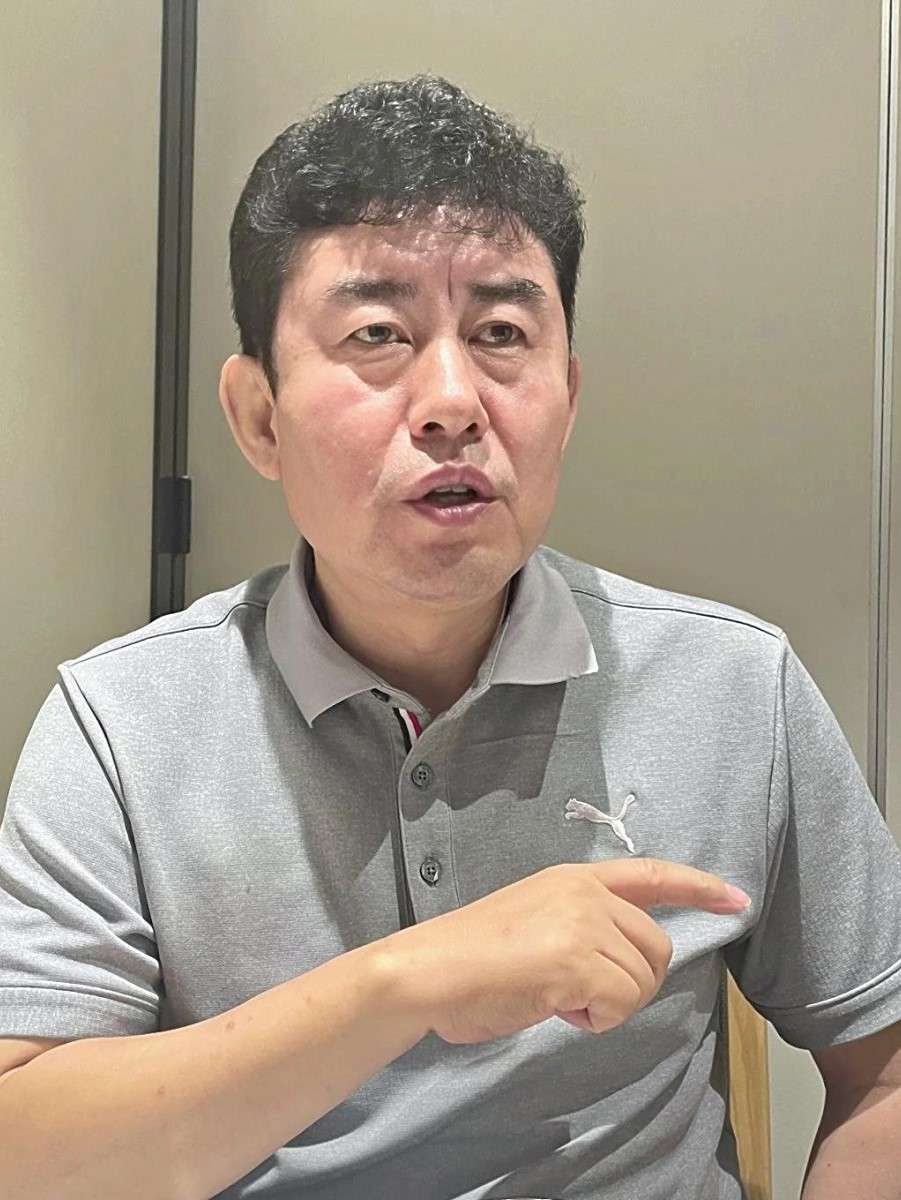North Korea Reinforces Border with China, Tightens Control to Prevent Defections that Could Threaten Kim Jong Un’s Rule

Defection prevention measures at border with China in Hoeryong, North Hamgyong Province, North Korea
Provided by Human Rights Watch
6:00 JST, October 11, 2023
SEOUL — The number of North Korean defectors entering South Korea via China has plummeted as Pyongyang has tightened its system to prevent their escape from the country.
Measures taken by the North during the novel coronavirus pandemic, such as the installation of more barbed wire fences along the border with China, have nearly closed off routes for North Korean residents to escape oppression and starvation.

Seo Jae Pyong
“Kim Jong Un is trying to reduce the number of defectors to zero,” said Seo Jae Pyong, a defector and 53-year-old president of a South Korean organization that supports North Korean defectors.
“It has become physically impossible to cross the North Korean border into China,” he said during a recent interview.
Born in North Korea, Seo had a job conducting geological surveys when he fled his homeland about 20 years ago after he was nearly arrested for listening to a South Korean radio broadcast.
In August, a North Korean resident contacted him and said with urgency: “If I don’t do anything, I will starve to death. I want to go to South Korea.”
In the northern part of North Korea, cell phones made in China can be used to call people in South Korea.
Seo could only reply, “There is no way to help at this time.”
Fencing off China border
When escaping from North Korea, the border with South Korea is heavily guarded by the militaries of both countries. The land at the border is also covered with countless landmines, making it impossible for ordinary people to pass through.
The route used by many has therefore been to cross into China with the help of brokers, and then travel overland to Southeast Asia. The defectors can then enter South Korea by air if they seek protection from the South Korean government in countries such as Thailand.
North Korea has been trying to shut down this route since the pandemic. In January 2020, Kim Jong Un’s administration stopped the traffic of people and goods at the border with China in the name of preventing the influx of the novel coronavirus. At the same time, large-scale construction has been carried out, including the building of additional fences in the border area.
In Hoeryong in North Hamgyong Province along the Tumen River that flows on the border with China, the fence was strengthened and watchtowers were set up at every 50 meters, according to an analysis of satellite images released last November by the international organization Human Rights Watch. Parallel to this fence, a second fence was also constructed.
The fence expansion work was carried out first along an area of the Tumen that was narrow, which had become a key escape path. The fences are built of concrete and barbed wire, and it is reported that some of the sections are electrified.
According to Seo, North Korean authorities plan to install a fence across the entire border with China, which is more than 1,300 kilometers long, by 2025.

Common route for North Korean defectors
Monitoring movements
North Korea also frequently changes the deployment of border guards, Seo said, because if they work longer in one location and have more contact with neighbors, “some may accept bribes to help them escape.”
The Public Security Ministry, North Korea’s equivalent of a police agency, issued a proclamation at the end of August 2020 stating that anyone found attempting to cross the border may be shot dead, according to Lee Sang Yong, the 43-year-old director of Daily NK, a Seoul-based website specializing in North Korean information,
The aim is to create a sense of fear among residents and discourage them from defecting.
Young personnel from the Reconnaissance General Bureau, North Korea’s foreign intelligence service, are reportedly sent to the Chinese side of the border to search for and pick up defectors.
They “monitor the movements of Chinese nationals who support defectors and sometimes raid sites where they come into contact with defectors,” Lee noted.
Even after managing to escape to China, the current situation across the border is also unfavorable for defectors. High-tech surveillance systems installed on streets in China, such as facial recognition and high-performance cameras, are preventing North Korean defectors from escaping detection.

Kim Yong Hwa
Kim Yong Hwa, 70, a former North Korean military officer and president of an organization that has helped thousands defect from the North over the past two decades, visited northeastern China this summer. He tried to explore new possibilities for North Korean defectors as Pyongyang eased its border controls and trade and human traffic were resuming.
“It is dangerous inside China,” Kim concluded. “It has become extremely difficult to evade the surveillance network.”
In the past, defectors who fled to China typically used fake ID cards prepared by brokers to impersonate ethnic Koreans in China and traveled by train or bus to the Southeast Asian border. With the current digitization of ID cards, however, forgery is no longer possible. They have no choice but to take passenger cars or taxis to Southeast Asia, but even on highways they have to go through strict security checkpoints.
On the day Kim planned to return to South Korea from China, he was interrogated by police who came to his hotel. The police officer gave Kim the names of markets and other places he had actually been to and questioned him about the purpose of his visit.
“The interrogation was a warning,” Kim said, “that they could see everything I was doing.”
Down to 2% of peak
The number of defectors has increased after the food crisis in North Korea in the mid-1990s called “The Arduous March” when country’s rationing system collapsed due to factors such as the 1995 floods. Some estimates say hundreds of thousands to millions of people starved to death.
Successive South Korean governments have accepted defectors and provided settlement assistance such as schooling, employment and housing. The number of defectors further increased, with 2,914 people entering South Korea in 2009, mainly due to the intensified activities of organizations that help people escape North Korea. The total number of North Korean defectors who have settled in South Korea is about 34,000.
After Kim Jong Un came to power, however, border security was strengthened and the number of defectors has been on the decline. Last year, the number of defectors was only 67, 2.3% that of the peak in 2009.
This year, 99 North Korean people had entered South Korea through June, but most of the recent defectors are those who were laborers in countries such as China or Russia and fled their workplaces.
It is believed that there have been only a handful of cases where North Koreans fled across the border with China.
Strengthening controls
The thorough prevention of defection reflects Kim Jong Un’s strong intentions.
Kim Jong Un is said to be most cautious of anything that might agitate his dictatorship. Defectors’ contact with relatives and acquaintances who remain in North Korea “may lead to outside information entering North Korea, causing residents to become suspicious of the current administration,” is one analysis from an official at South Korea’s Unification Ministry.
Kim Yo Jong, Kim Jong Un’s sister and vice department director of the Central Committee of the Workers’ Party of Korea, reportedly ordered at the direction of her brother tighter control of diplomatic relations when she inspected Hyesan in Ryanggang Province along the border with China.
At the party’s congress in January 2021, Kim Jong Un called for a struggle against “antisocialism and nonsocialism.” His urging meant not only blocking the influx of capitalist culture such as South Korean dramas, but also preventing acts of defection.
Pyongyang and the country’s regional authorities have established headquarters to direct these efforts and are competing with each other to show the results of their strengthened crackdowns.
Top Articles in World
-

Israeli Ambassador to Japan Speaks about Japan’s Role in the Reconstruction of Gaza
-

Videos Plagiarized, Reposted with False Subtitles Claiming ‘Ryukyu Belongs to China’; Anti-China False Information Also Posted in Japan
-

Nepal Bus Crash Kills 19 People, Injures 25 Including One Japanese National
-

Ukrainian Ambassador Closely Watching Japan’s Revision of Defense Export Rules, Hopes for Future Arms Support
-

China, India Tapping into Promising African Market; Beijing Announces Tariff Cuts, Both Countries Aim to Expand Exports
JN ACCESS RANKING
-

Producer Behind Pop Group XG Arrested for Cocaine Possession
-

Japan PM Takaichi’s Cabinet Resigns en Masse
-

Man Infected with Measles Reportedly Dined at Restaurant in Tokyo Station
-

Israeli Ambassador to Japan Speaks about Japan’s Role in the Reconstruction of Gaza
-

Videos Plagiarized, Reposted with False Subtitles Claiming ‘Ryukyu Belongs to China’; Anti-China False Information Also Posted in Japan


























